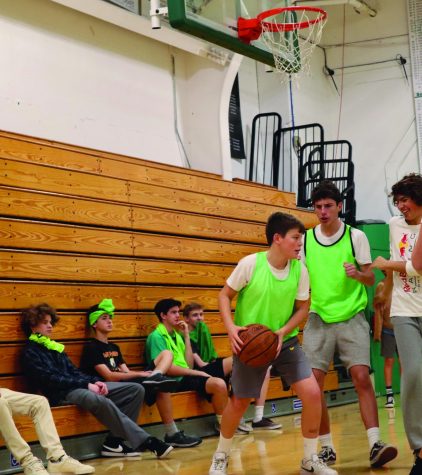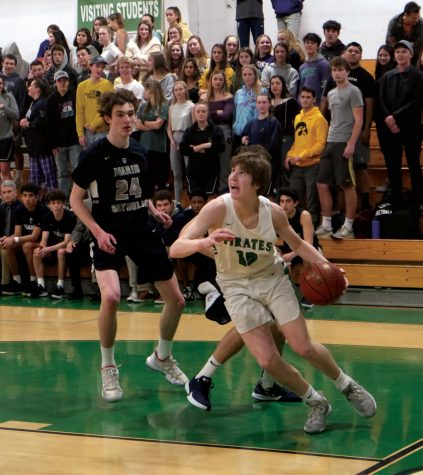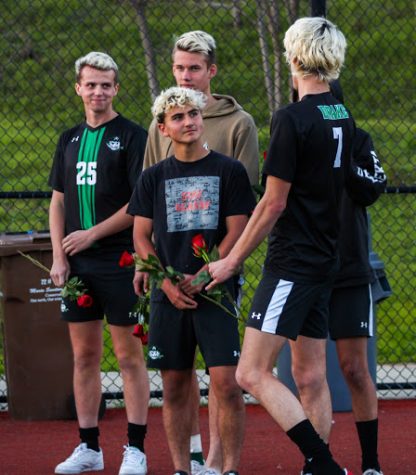Underrepresentation of women in sports negatively affects young female athletes’ outlooks
It’s a hot summer day in Milwaukee, and the Giants versus Brewers game is shown on thousands of televisions across America. The bases are loaded, and Buster Posey is up to bat. Behind the home plate, the crowd is tiring as the game goes into extra innings.
Posey settles into his batting stance, circling the bat a couple times behind him. Matt Albers, the Milwaukee pitcher, throws a 92 mile per hour pitch at Posey. What usually would have been a strike turns into a high drive to centerfield. The crowd roars as the ball flies up and up until it hits the scoreboard, bouncing back to centerfield.
From their living rooms, Giants fans watch Posey’s game-winning grand slam on Fox, CBS, ESPN, NBC, ABC. Some Bay Area fans even listen to Duane Kuiper’s, “IT IS OUTTA HERE!” on KNBR 680.
While thousands celebrated the Giants’ win on that memorable July day, another game was played that received no coverage, no publicity, and no celebration.
The United States Specialty Sports Association (USSSA) Pride and Cleveland Comets of the National Fastpitch League (professional women’s softball) played a six-inning game at Sprenger Stadium in Ohio. The Comets celebrated their 5-0 win alone that night while the rest of America celebrated the men’s team.
Only four percent of sports media coverage is of women, according to the United Nations Educational, Scientific, and Cultural Organization. Men dominate the sports industry, while their female counterparts sit tight on the sidelines.
For decades, women have fought for equality in sports. Take the U.S. women’s soccer team, for example. In March of 2019, they filed a lawsuit against U.S. Soccer for gender discrimination. According to National Public Radio (NPR), after winning the 2015 Women’s World Cup, the women were paid less than a third of the men’s team’s pay, who lost in round sixteen. There are thirty-two rounds.
The lawsuit continues to make headlines as U.S. Soccer argues why women don’t deserve equal pay. Recently, they claimed that the men’s team has “higher responsibility” and the men “require a higher level of skill” than the women’s team, according to CNN.
Back in 1973, female tennis player Billie Jean King strove to defeat the assertion that women are inherently athletically inferior to men. In a match against Bobby Riggs, a retired tennis player searching for one last moment of fame, King reigned champion proving why women deserve as much money and respect as men in sports.
The famously named “Battle of the Sexes” received 90 million views, and in 2017, the story of King and Riggs made it to theaters all over the world.
In the 70’s, King set out to question gender inequality in sports. Today, young women athletes still question why their role models aren’t represented equally to men.
“Men’s sports always get prioritized both with funding and in the media. What makes women’s sports less important?” Naomi Betz, a member of the Drake mountain biking team, said.
Margie Powers, a mother of two Drake students, played soccer during her freshman year at Santa Clara University. When she arrived at school, she and her teammates, with no kitchen nor money for food, learned that they would be responsible for their own meals. After a few days, their coach negotiated a deal with them: if they worked in the cafeteria in the morning, they could eat their meals there during the day. What the athletes didn’t know was that they were working to serve the men’s football and soccer teams. After both men’s teams finished their meals, the women could finally sit down and dine on the leftovers.
“It was humiliating and eye-opening,” Powers said, “I’ve never felt that women and men athletes are treated the same… it is also a widely and deeply held belief that men deserve the first and best, always. I do think this is changing [though].”
Changes have been seen through influential companies like Nike. In recent years, they have become advocates for women’s sports. Nike’s inspirational clips like “Dream Further,” “Never Stop Winning,” “One Day We Won’t Need This Day,” inspire female athletes to keep hungering for gold medals, world cups, championships, and overall recognition.
Stories like Powers’ are not common occurrences for modern female athletes today, although it is clear that women are far from equality when it comes to sports. This begs the question, how are the young girls aspiring to be professional swimmers, basketball players, wrestlers, or hockey players affected?
To Elsa Simenstad, co-captain of the Drake sailing team, it’s made her feel like an outsider.
“Whenever I’m at a regatta… instead of just thinking about competing as best as I can, I’m constantly worrying about misrepresenting my gender,” Simenstad said.
Tasha Shafer, a Drake basketball player, hardly sees her gender displayed in sports media. She feels as though “women are being silenced and told we’re not good enough…” Shafer said. She also believes that because of the lack of representation in the media and inequality in opportunity, people are missing out on the incredible achievements of female athletes.
For Shafer and Drake cross country and track runner Hayley Ballard, there’s something special about watching women’s sports compared to men’s.
“When I see women athletes compete, I feel like I can connect more to them and understand how hard they must’ve worked to get there. Obviously male athletes work really hard at their sport too, but sometimes for me it’s just like ‘Oh, there’s another male athlete on TV.’ It doesn’t really strike me as special,” Ballard said.
Additionally, Shafer feels much more inspired watching women compete rather than men.
“Women’s athletics are often overlooked and not taken seriously by a lot of people. But in reality, female athletes have to fight and work so much harder than men just to be recognized. Watching women compete is more inspirational to me because of the amount of time and dedication it took them to get where they are today,” Shafer said.
So, Fox, CBS, ESPN, NBC, and ABC, take notes. It’s time for sports television programs to recognize the hard work and dedication of female athletes. By not recognizing their drive, young girls are receiving the message that their commitment to their sport is not worth as much as men’s. Their worth as young women and as athletes is lessened. Women deserve the opportunity to change the athletic world and for their accomplishments to be celebrated.

Melissa Auchard, a senior, is in her second year of journalism. When she’s not training for track she likes to spend her time reading, baking, or surfing....








Joseph Richardson • Jan 21, 2021 at 11:48 PM
Men are objectively better at sports than women. From a biological basis.
Joseph Richardson • Jan 21, 2021 at 11:46 PM
This is a dreadful argument lol